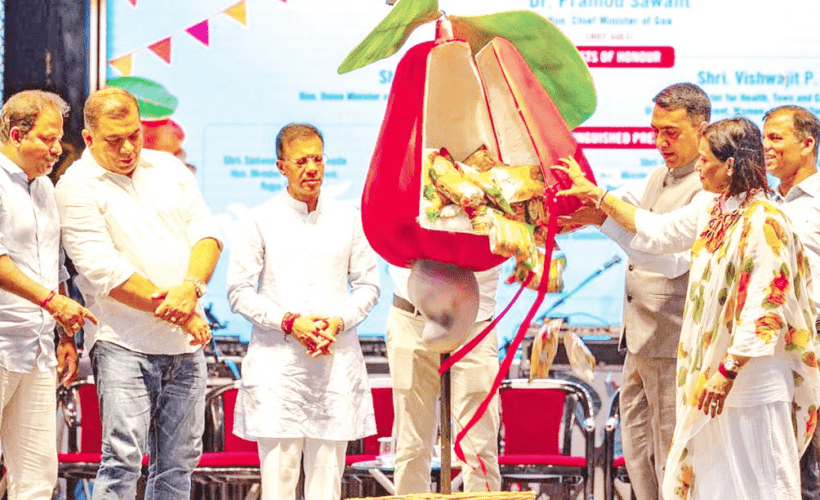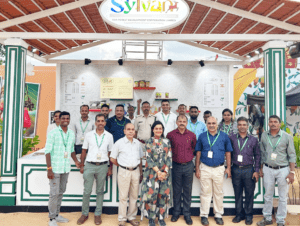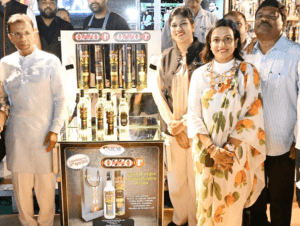
Two days of food, music, and heritage that brought Goans together in pride and joy
The Goa Cashew Fest 2025 was held on May 17 and 18 at D.B. Grounds in Campal, Panaji, bringing together farmers, artisans, chefs, distillers, and visitors in a vibrant celebration of Goa’s most iconic crop – the cashew. Though originally scheduled for April, the event was postponed due to national security concerns following the Pahalgam terror attack. Despite the delay, the festival returned with renewed energy, drawing large crowds eager to connect with their roots and explore the many dimensions of cashew’s role in Goan life.
Organised by Goa Forest Development Corporation (GFDC), the festival reflected the importance of cashew in the state’s economy, environment, and culture. Cashew trees were introduced to Goa in the 16th century by the Portuguese, initially for soil conservation. Over time, they thrived in the local climate and became deeply embedded in the Goan identity. Today, cashew is not only a major agricultural product but also a source of pride – whether in the form of roasted nuts, sweets, or the traditional cashew feni.
The 2025 edition of the festival was marked by the launch of three major initiatives, each rooted in sustainability, economic opportunity, and heritage preservation. The first was the launch of Sylvan, a new packaged cashew brand developed by GFDC. Sylvan promises high-quality nuts directly sourced from government-managed orchards and features QR-coded packaging that allows consumers to trace the exact origin of their product. This combination of transparency, quality, and affordability ensures that Sylvan stands out in the growing market for ethical and sustainable food products, all while remaining accessible to the average consumer.
preservation. The first was the launch of Sylvan, a new packaged cashew brand developed by GFDC. Sylvan promises high-quality nuts directly sourced from government-managed orchards and features QR-coded packaging that allows consumers to trace the exact origin of their product. This combination of transparency, quality, and affordability ensures that Sylvan stands out in the growing market for ethical and sustainable food products, all while remaining accessible to the average consumer.
Equally important was the introduction of a coastal cashew plantation drive, an environmental initiative focused on restoring degraded coastal stretches, particularly in Salcette taluka. The drive aims to prevent soil erosion, enhance climate resilience, and generate seasonal employment for local communities. By choosing cashew trees for this afforestation project, the initiative links ecological restoration with a crop already closely tied to the region’s economy and culture, offering a model for community-based environmental action.
Another highlight of the festival was the launch of Ozzo Feni, promoted as India’s first Geographical Indication (GI)-tagged feni. This formal recognition not only preserves the authenticity of the traditional Goan spirit but also offers local distillers a valuable tool to market their product on a broader scale. The GI tag ensures that only feni produced in Goa using traditional methods can use the name, protecting the livelihoods of local artisans and elevating feni as a cultural product with global appeal.
India’s first Geographical Indication (GI)-tagged feni. This formal recognition not only preserves the authenticity of the traditional Goan spirit but also offers local distillers a valuable tool to market their product on a broader scale. The GI tag ensures that only feni produced in Goa using traditional methods can use the name, protecting the livelihoods of local artisans and elevating feni as a cultural product with global appeal.
Beyond these announcements, the two-day event was packed with activities that brought Goan culture to life. The evenings featured energetic performances by artists like Meet Bros and Neeti Mohan, while local designer Philu Martins curated a cashew-inspired fashion show that blended traditional motifs with contemporary flair. Over 50 stalls offered a variety of cashew-based dishes and Goan delicacies, from creamy curries and tangy feni prawns to cashew sweets and snacks that highlighted the ingredient’s versatility. Visitors could also participate in feni tasting sessions guided by master distillers who shared insights into the traditional fermentation and distillation process.
What made the festival truly special was its immersive nature. Guests were invited to witness the entire journey of the cashew – from plucking the fruit from trees to roasting the nut, offering a hands-on look at the effort and skill behind every bite. The bustling marketplace featured everything from premium nuts and beauty products to handicrafts and souvenirs, showcasing how deeply the cashew is woven into everyday Goan life.
Children enjoyed carnival games, face painting, and rides, while adults participated in workshops on cooking, sustainability, and entrepreneurship. Informative sessions brought together cashew farmers, processors, marketers, and government officials to share knowledge, explore market opportunities, and discuss the future of cashew farming in Goa. Exhibits focused on eco-friendly farming methods, conservation of cashew-growing regions, and the importance of supporting small-scale producers, reinforcing the festival’s commitment to environmental awareness. In many ways, the Goa Cashew Fest 2025 was more than just a celebration – it was a heartfelt tribute to the resilience and creativity of the Goan people. It brought together tradition and innovation, nature and culture, and showcased the potential of cashew not just as a crop, but as a symbol of Goa’s identity. As the lights dimmed and music faded on the final night, the message was clear: this was not just a festival of flavor, but a festival of belonging.





